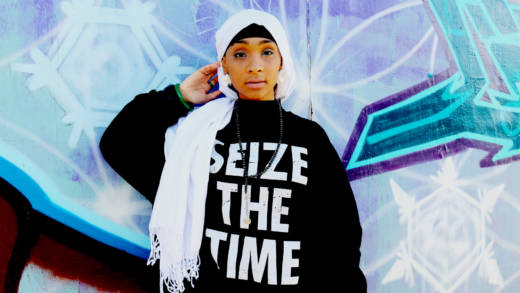“With this specific project, it was just a way for me to speak up for not only myself, but for the millions of women and Muslim women who are seen as oppressed or seen as having a disadvantage because I have on a hijab, or that I have a disadvantage because my skin is dark,” she says coolly. “On this album, I embrace everything I am and everything that is rejected and marginalized in this industry.”
Sharrief is busy these days. Before she releases the album at the end of February, she’s dropping the EP Don’t Forget Me in early January. In contrast to the full-length project, Don’t Forget Me is light-hearted, with feel-good tracks more in the vein of her autobiographical 2012 debut, Mental Cycles & Mood Swings, an album that grappled with self-discovery and coming of age.
“I’m not a preacher in my music,” she says of the contrast between the two records, adding that she admires how Tupac and Lauryn Hill balanced making catchy and meaningful work.
Her skill in achieving that balance has been obvious enough, at least, to catch the attention of One Drop Scott, a veteran Bay Area producer who worked with Mac Dre; Scott produced Mental Cycles as well. Both he and San Francisco’s Pharoahgahmoe handled production on both of Sharrief’s upcoming projects.
Sharrief is originally from Sacramento, and while the rest of her family is Christian, her parents both converted to Islam independently before they met.
“I grew up in a religious household, but I also grew up in a black household,” said Sharrief. “We were Muslim and we went to the Mosque, we celebrated Eid, we celebrated our traditions, we prayed. But we also deal with the racism in our communities.”
As an adolescent, Sharrief wanted to be a soul singer but switched to rapping full time after an accident damaged her vocal chords. After relocating to the Bay Area nearly 10 years ago to attend community college, she transferred to California State University, East Bay to study media and broadcasting, and introduce herself to the local music scene. That process was not without its growing pains.
“It took me some time to find the middle mark and say, ‘Okay, I’m Muslim and I’m black. I can do this both,’” she said. “And I think it happened after my first album for sure.”
Sharrief’s music has grown increasingly, overtly political as she’s become more involved with activism in recent years. In a remix of Beyoncé’s “Formation” called “Information,” she uses a sample of Malcolm X’s speech from the 1964 March on Washington as a hook — over which she raps lines like I like my hijab on/I stay covered up ’cause I be headstrong, interwoven with lyrics about police brutality.
Unsurprisingly, she’s built a following in local conscious hip-hop circles, and has become a regular name at events that combine music and social justice work.
In October, she held it down as one of the only female performers at the Black Panther Party’s 50th anniversary rally and concert in Frank Ogawa Plaza, sharing the stage with local legends Mistah F.A.B., Dru Down, and Tajai of Hieroglyphics. Earlier this month at the Fox Theater, she opened for rap legend Yasiin Bey (formerly known as Mos Def), who’s currently on his last tour before he retires from music. The show went so well that Bey invited her to open for him again in Sacramento.
Sharrief’s music feels urgent — especially in light of the recent Trump victory, and the ensuing spike in hate crimes against people of color, particularly against Muslim women in religious dress. But the rapper says she’s not intimidated by the current political climate, in part because rapping offers her a platform to speak truth to power.
Indeed, one of the first things Sharrief did after Trump won the election was speak at a protest organized by the Black Power Network.
“For me, as a Muslim woman, I found that it was important for me to go to this protest and speak for Muslim women like, ‘We’re not scared of this,’” she says. “But it is hard when you have to go through this kind of racism. I know from experience. When 9/11 happened, I was at school and I got my hijab torn off.”
Despite the challenges the next four years promise, Sharrief said it’s important for marginalized people and allies to organize. “I feel like the best way to beat a bully is to stand up to a bully and show him you ain’t gon’ take it,” she says. “And right now, he’s all words. He ain’t got no action. And God willing, he won’t be able to do no action with the power of the people.
“Long story short, what’s up Trump? Whatchu got for us?”



